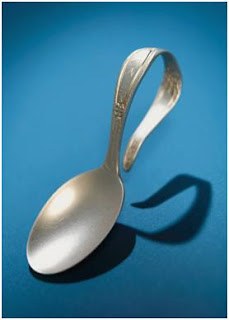Bending the Spoon Theory
There’s a popular description of having a disability that makes its way eventually onto every multiple sclerosis discussion board on the internet: the Spoon Theory, Christine Miserandino’s personal story and analogy of what it is like to live with a disease (lupus in her case). Indeed, it is an eloquently simple description of what life often is like with multiple sclerosis and its ubiquitous fatigue.
In short, she explains to her best friend “that the difference in being sick and being healthy is having to make choices or to consciously think about things when the rest of the world doesn’t have to.” To demonstrate this, she grabs up a dozen spoons and tells her friend “when you are healthy you expect to have a never-ending supply of ‘spoons.’ But when you have to now plan your day, you need to know exactly how many spoons you are starting with.” Every task, whether it’s playing with your children or showering or making dinner, siphons valuable energy (or spoons). She takes her friend’s spoons as she imagines her day unfolding, confiscating them at an alarming pace (shaving, getting dressed, preparing breakfast). There are tough choices—if one chore gets done, another one doesn’t. “She needed to choose the rest of her day wisely, since when your spoons are gone, they are gone. Sometimes you can borrow against tomorrow’s spoons, but just think how hard tomorrow will be with less spoons.”
And here is where the Spoon Theory gets a bit bent ala Uri Geller. Instead of having fewer spoons tomorrow, what if you could actually collect more spoons? Instead of a dozen per day, maybe 14 or 15, and then maybe 20 or even 25.
Perhaps you can. According to copious multiple sclerosis studies and research, exercise reduces fatigue in MS, in some cases dramatically. I know, it sounds counterintuitive. Exercise is hard. Exercise makes you tired. Exercise costs you precious spoons. You certainly can’t afford to waste any of them on an endeavor that on the surface accomplishes little more than making you stinky, musses your hair, and makes it feel as if a pickup packed with portly pachyderms has presciently pancaked you.



Comments
Another famous bit of misunderstood colloquial wisdom is “Don’t over do it”.
AMF Adventures